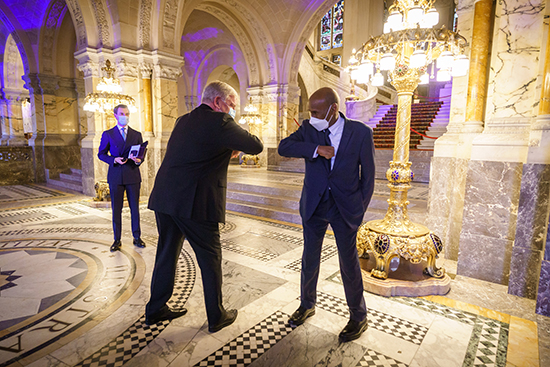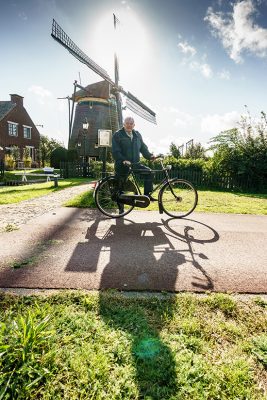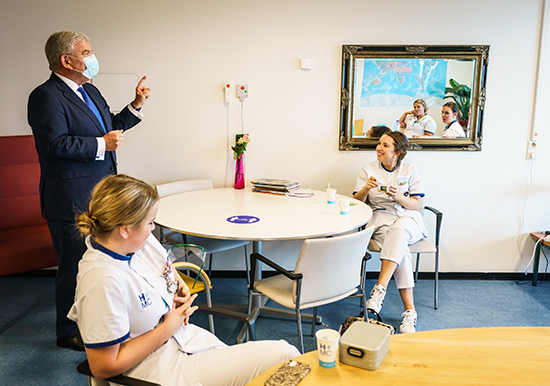Nanda Jagusiak-Monteiro interviews Mr. Jan van Zanen, Mayor of The Hague
Former posts: Deputy Mayor of Utrecht (1998-2005); Mayor of Amstelveen (2005-2013); Mayor of Utrecht (2014-2020). Mr. Van Zanen has chaired the Association of Netherlands Municipalities (VNG) since 2015 and is joint chair of the United Cities of Local Governments (UCLG).
You have been Mayor of the Hague since 1st July 2020. How has it been so far? Was there a culture shock coming from Utrecht, and what impressed you most about The Hague?
As you might expect, my first few months as Mayor of The Hague were spent meeting people. Even though that mostly had to take place online because of the stricter pandemic measures. In hard times, like now during the pandemic, you also see the truly positive sides of the city. I was impressed by the dedication and enthusiasm with which The Hague’s residents turned out to help people in their communities, neighbourhoods, and the city itself in these difficult and often uncertain times.
A major difference between Utrecht and The Hague, of course, is the presence of the many international organizations, especially the international courts, in The Hague. I have already visited a number of them to get acquainted with this new environment. I am impressed by how they contribute to international peace and justice. Working in a city that supports this work, obviously, is a new experience for me.
You are also the Chair of the Association of Netherlands Municipalities (VNG). Can you please tell the readers what that involves?
VNG, the Association of Netherlands Municipalities, is an umbrella organisation covering all the Netherlands’ 352 municipalities. The aim of the Association is to strengthen local government so that municipalities can provide their residents with the best possible service. The VNG does this by providing advisory services and by promoting the interests of local government to central government. As chair I conduct the VNG’s meetings with ministers and other tiers of government (the Provincial Authorities and Water Boards).
I am also internationally active on behalf of the VNG. Since November 2019 I have been joint chair of the global organization for municipalities: United Cities and Local Governments. UCLG represents municipalities and all other decentralized government bodies in global fora, such as the UN. As joint chair I can help influence the direction of the organization. The UN Global Goals are a common theme in the UCLG. In this context my focus is specifically on Global Goal 11: working to create inclusive, safe, resilient and sustainable villages, towns and cities, and Global Goal 16: working to create a peaceful and just society for everyone. These both closely match The Hague’s profile and priorities.
It is something special to be able to represent the interests of municipalities, and thus give our citizens a voice in both national and global fora.
The Hague, City of Peace and Justice, is an important city, housing all the embassies and many of the most important international organizations. There are about 60,000 expats (including partners and children) living here. Do you have a special message for them?
For our expats too, the COVID-19 pandemic has been a difficult period. Many of them are still in The Hague, but far from their families and friends. Others cannot return to The Hague but are still in charge of important work. I have sent out a holiday season message to them all, telling them that we appreciate their presence and contribution to our city and wish them every success in these difficult times. Our International Centre (THIC) supports them as much as possible.
Have you already met the DGs/Presidents of the international organizations? And how important is the presence of these organizations for The Hague?
Although COVID-19 has not made it easy, I have already visited a number of them. You would be surprised by the variety of organizations in our city, from the Courts I already mentioned, to European organizations working on peace and security, such as Europol, Eurojust, as well as NATO and the OPCW. Not to mention hundreds of NGOs working on the same issues. Their presence is not only important to The Hague in terms of jobs (40,000, by the way); they form the cornerstone of our profile as City of Peace and Justice, and they do important work helping to create a better world for everyone. I actively bring this to the attention of the United Cities and Local Governments (UCLG) organization and in my contacts with the UN. It is important to underline just how much cities do with regard to peace, justice and diplomacy.
The 75th anniversary of the United Nations was celebrated on 24th November. How was this marked and how important was it for The Hague?
The jubilee was celebrated in The Hague and it has not yet finished because the International Court of Justice will mark its 75th anniversary in April of this year. Activities had been planned all over the city but that was difficult because of the pandemic again, of course. But together with UNICEF we still organized an interesting exhibition with 75 stories about 75 years of the UN outdoors on the Lange Voorhout. And we had a nationwide broadcast on YouTube from ‘our’ Peace Palace, focusing on the important role of the UN over the last 75 years. If you want to learn more about the UN and its Sustainable Development Goals (SDGs or Global Goals) you can visit the Museon (when it’s open again), or have a look at the web page of the Association of Netherlands Municipalities (VNG): https://vng.nl/rubrieken/onderwerpen/global-goals-voor-gemeenten
So yes, 75 years of the UN is important and we celebrated it. We also intend to organize a debate on the UN, its relevance and how it could be improved, with Alana O’Malley (Professor of UN studies in The Hague), for example.
What is The Hague Manifesto?
The programme celebrating 75 years of the UN consisted of personal stories. But also included a Manifesto presented by six young people from The Hague, with suggestions on how to do more in the UN context to fight inequality, climate change, and promote solidarity. They also suggested establishing a permanent seat for youth in the UN. Personally, I was very impressed by their dedication and by their proposals, organized in cooperation with Professor O’Malley.
It won’t surprise you that through the UCLG I also actively advocate for more inclusion of local government in the UN system. At the moment, the UN is still an alliance of national governments only; we need to achieve a more inclusive and multi-layered UN system over the next 25 years. The COVID-19 pandemic has shown very clearly that local governments are on the frontline; this is where they act and they are closest to the people. The UN system would benefit a great deal from having them at the table, permanently.
What can you tell me about the ‘The Hague against Corona’ campaign, which began on 3rd November 2020?
‘The Hague against Corona’ is a campaign by and for The Hague. Celebrities and ordinary people living in The Hague show us how to observe the rules surrounding the coronavirus pandemic. The campaign is also based on the guidelines developed by the behavioural unit of the National Institute for Public Health and the Environment (RIVM).
The personalities leading ‘The Hague against Corona’ campaign can be seen on advertising columns, lampposts and digital screens all over the city. At the same time the city is distributing posters, uploading videos and stories to the network in the city districts. About 250 contacts share the various campaign materials with their own constituencies. Everyone may use the images and the logo, they are all freely available on the website: denhaagtegencorona.nl. There you will also find the latest coronavirus measures. The website itself and most of the communications have been translated into Arabic, Bulgarian, Chinese, English, Polish, Romanian, Spanish, Turkish and Haags (the city dialect of The Hague).
Is it true that you are biking around in The Hague to discover the various areas of the city and to speak to the people you meet?
I have been out and about quite a bit over the past few months in our remarkably green city, whenever possible, by bike. Over the last few weeks, I have had to take a step back, however. I also have to observe the social distancing rules. I do still sometimes, spontaneously and unannounced, hop on the bike to try to give people a boost. I am still learning to find my way around the city and hope to see more of The Hague, and speak to more people in the future.
The traditional New Year’s dip in Scheveningen on 1st January was cancelled due to the pandemic. I heard that you were also planning to take part, is that true?
Unfortunately, the traditional New Year’s dip on 1 January 2021 had to be cancelled. Which is only logical in view of the coronavirus measures. As Mayor of The Hague, the city with the Netherlands’ biggest New Year’s ‘polar bear plunge’ I certainly intend taking part in the New Year’s dip, as soon as that is possible. I love swimming and the sea.
About 30 cars burnt out in The Hague on New Year’s Eve, but it was relatively calm compared to other years. Can you comment on this, please?
Every year the city, the emergency services, community service officers and residents together do their best to make sure that New Year’s Eve in The Hague is as safe as possible. Over the last few years this has resulted in a downward trend in the number of incidents on New Year’s Eve. Nevertheless, it was this year again a busy night for the emergency services with incidents in which the fire service, police and welfare workers had to intervene repeatedly. Despite the ban, fireworks were let off, cars were set alight – as you mentioned – and several times fireworks were thrown at emergency service crews and a fire engine was pelted with bricks. Such behaviour is intolerable.
It was good to see that many people respected the call to stay at home and celebrate New Year’s Eve on a small scale. I am proud of all the volunteers, police officers, community service officers, fire service and ambulance crews who sacrificed a night’s sleep to keep things under control. While we must not forget the hospital doctors and nursing staff either. Their day-to-day work is already difficult and exhausting because of the coronavirus, so I have all the more respect for them.
King Willem Alexander accompanied you on New Year’s Eve when you visited some places. Could you tell us more, please?
During the night, together with His Majesty the King and the Head of the District Public Prosecution Service and the Chief of Police, I visited De Yp police station where the multidisciplinary command centre is based. After which we together visited Hoefkade police station, we spoke to the people who keep the city clean, and to staff working at the HMC Westeinde hospital. I am proud of all the care professionals who were working so hard on behalf of our city on New Year’s Eve. And even more so, given that the pandemic has already made the past few months extremely difficult for them.
If you could describe the city of The Hague in one sentence, what would it be?
Please do feel at home here! Just as I do.


